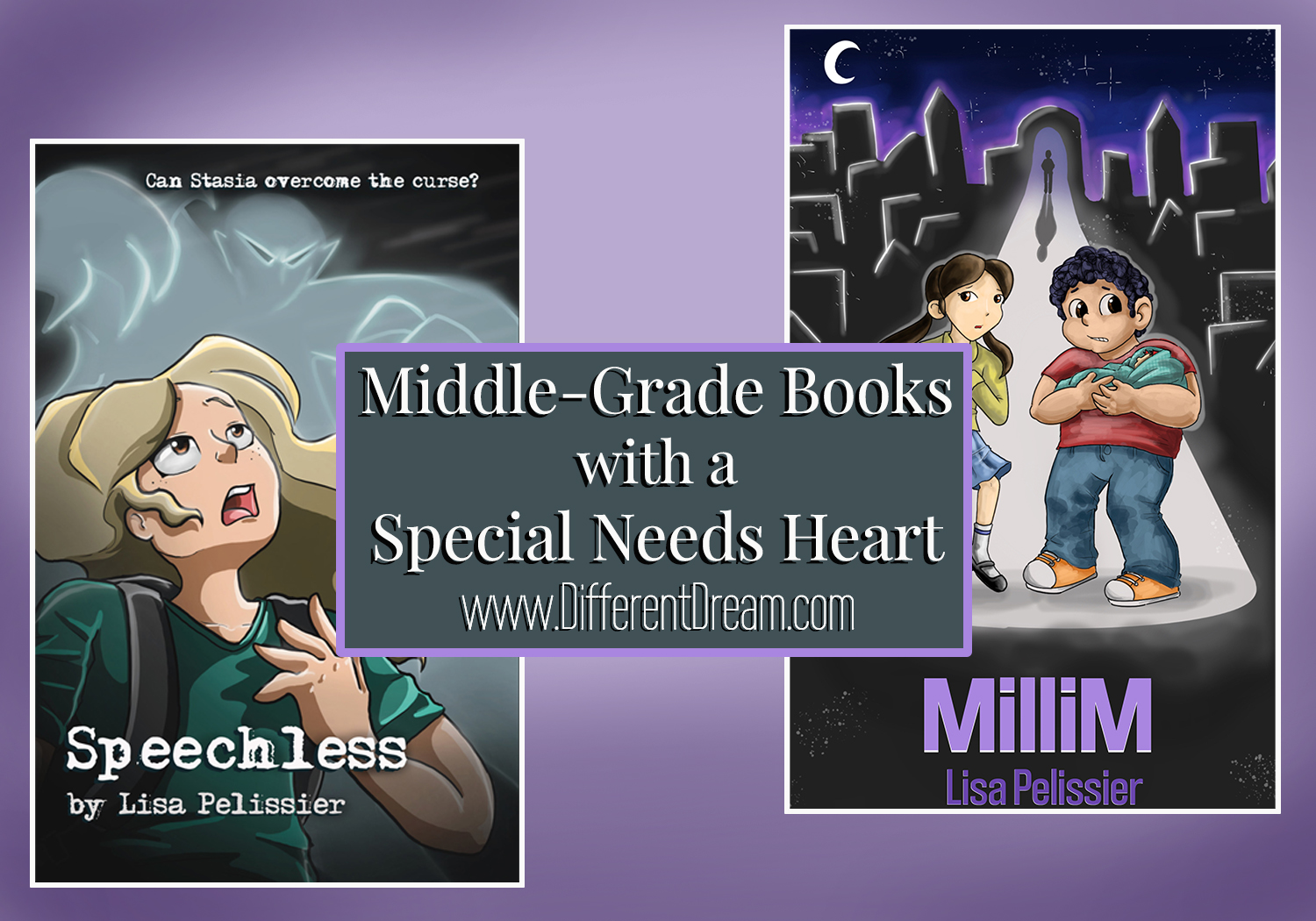Middle-Grade Fiction about Kids with Special Needs

Middle-grade fiction about kids with special needs is gaining traction in the writing world, though the stories tend to focus on conditions that can be seen and easily identified. In this post, guest blogger and book writer Lisa Pelissier introduces readers to characters in her middle-grade fiction who have invisible special needs. Be prepared to fall in love with Millie and Stasia and Andie like I did!
I never thought I would find myself occupying the niche of writing middle-grade fiction about kids with special needs. But then, I never thought I’d be parenting kids with special needs. But here I am. They say you write what you know, and I certainly know the struggles and triumphs my kids have had.
All my books feature characters with (mostly) invisible special needs. In some books, it’s more prominent than in other books. There’s always a hint of neurodivergence, anxiety, or mental illness. And sometimes, there’s more than a hint.
One of the things I want to come across to those who read my middle-grade fiction about kids with special needs, is that no one has to be perfect before they can do good, before they can become a hero, before they can be the main character in the narrative. And when the “good guys” win in the end, the disabilities don’t go away. That’s not the battle they’re fighting.
My first book to prominently feature a main character with a disability was MilliM, a wacky dystopian middle-grade novel published in 2020. The main character, Millie, has extreme OCD and has to have everything in her world be symmetrical. When Millie and her best friend Silas (who is autistic, though I never say so in the book) find a baby on her front porch—a baby with a very asymmetrical face—Millie loses it. She knows her mom will want to keep the infant, but she also knows if she has to look at that distorted baby face every day, she’s going to lose her mind. She and Silas get on their bikes and ride to the city center, to the Council of Benevolence (remember—this is a dystopian book), to see if they can trade the baby in on another grandmother. It goes on from there. But one of my favorite things about MilliM is that Millie doesn’t overcome her disability. She is who she is. Sometimes her OCD drives her to do the wrong thing—and sometimes it’s the reason things turn out okay. But it doesn’t go away. And she’s still a hero—albeit a broken one. Like any of us—with or without a disability—would be.
A huge chunk of the goal of not making the disability the central focus and issue to be solved is smashed to smithereens in my upcoming book, Speechless. The main character, Stasia, has been diagnosed with selective mutism, a disability preventing her from speaking aloud with anyone but her best friend, Andie, who has non-verbal autism and a bunch of other diagnoses. Stasia finds out that the reason she can’t speak isn’t actually her neurology, but a fairy curse, laid on her when she was only three years old. Together, she and Andie puzzle out the riddles the fairy gives her in order to break the curse and free her voice. In the process, both she and Andie learn some valuable lessons about what it means to be a friend.
This book was my daughter’s idea—the one with selective mutism. I’ve been working on the book for four years now, and in that time, my daughter has made big strides. She’s never told me why she dreamed up the backstory behind this novel. Sometimes I wonder if pretending her disability was the result of something outside of herself could be helping her cope with it. I mean, believing you’re inherently broken is devastating. But if it’s just a fairy curse, then what? It’s not your fault. It takes the burden away. Not that any of my kids’ disabilities are their fault, but I know from my own life that it’s easy to absorb responsibility—and blame—for things that are not yours to bear. But other times, I just think she has a really good imagination.
Having Stasia’s disability be a curse was uncomfortable for me. I didn’t want to send the message that disabilities are something that will magically go away. I fought with myself about whether to write this novel. I pressed on because I love my daughter and wanted to follow through with her idea. And I think, in the end, I’ve succeeded in what I wanted the book to say. The presence of non-verbal, autistic, really messy Andie redeems the story. She’s broken in ways that won’t be fixed. But she is who she is. She’s valuable. She’s one of the heroines of the story. She’s real. I hope the sweet friendship between these two girls who were born inside my mind and eventually became middle-grade fiction about kids with special needs will inspire children to look for friendship in places they would never have expected to find it.
Do you like what you see at DifferentDream.com? You can receive more great content by subscribing to the monthly Different Dream newsletter and signing up for the daily RSS feed delivered to your email.

By Lisa Pelissier
Lisa Pelissier lives in Oregon where she is a homeschool mom and author of five middle-grade fiction novels, the second-grade Monsters series, and a YA fantasy novel. Lisa owns SneakerBlossom Books, offering Christian, classical homeschool Study Guides and curriculum. She blogs at Eleventh Willow, offering encouragement for Christians parenting the mentally ill. She also works as a freelance copy editor, copy writer, and a marketing editor. In her spare time Lisa enjoys playing the piano and writing books.
Subscribe for Updates from Jolene
Related Posts
Jesus Loves Me This I Know
Mark Arnold takes comfort and encouragement from his son’s rendition of “Jesus Loves Me,” which has been shared with so many.
Does God Speak Dutch?
Guest Blogger Steve Harris ties a favorite Christmas movie to a favorite poem to bring encouragement to special needs parents.
This Thanksgiving I’m Grateful for Grief
“This Thanksgiving, I’m grateful for grief” is not something you hear a lot. Jolene explains why this is her heart this Thanksgiving.






0 Comments